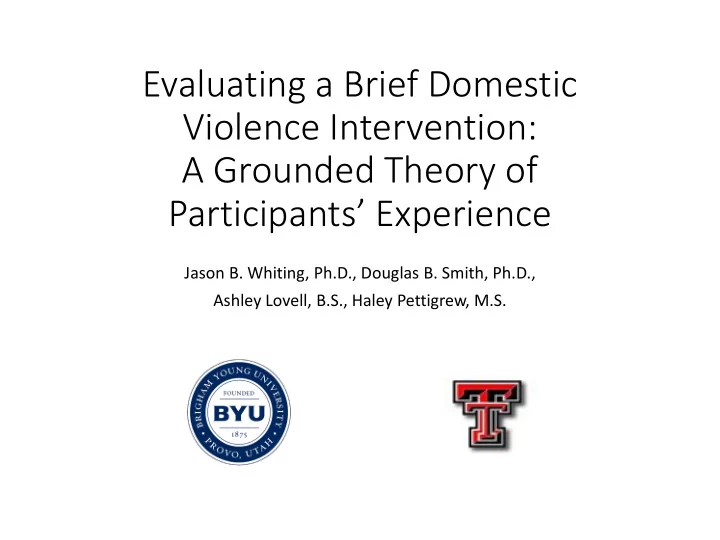

Evaluating a Brief Domestic Violence Intervention: A Grounded Theory of Participants’ Experience Jason B. Whiting, Ph.D., Douglas B. Smith, Ph.D., Ashley Lovell, B.S., Haley Pettigrew, M.S.
• The challenge of Intimate Partner Violence (IPV) • Many couples are hesitant to disclose • Therapists are often at a loss how to address it • Conjoint treatment may be Introduction contraindicated • Around 65% of couples have some violence in their history • There are efficacious treatments for moderate, non-controlling violence
Research questions • 1) What is the experience of clients who participate in a brief intimate partner violence intervention? Purpose of • 2) What aspects of this intervention the Study were most helpful to the clients? Which aspects of the intervention were least helpful? • 3) How did this experience affect the couple’s relationship?
Procedures • Couples seeking treatment at a university clinic • Those with severe violence, ongoing substance abuse, and issues of lethality were screened out
Inclusion Criteria & Sample • Both partners at least 18 years old • At least one member of the couple reports severe psychological violence or any physical violence in the current relationship • Both partners feel safe discussing the violence in a conjoint session • Both partners agree to add the discussion of violence to their treatment plan at the Family Therapy Clinic • Both partners agree to sign a no-violence contract. • Sample included 36 individuals
• Two, two-hour sessions with family therapy graduate students • After the two sessions, individuals were interviewed • Used constructivist grounded theory methodology to collect/analyze the data. Methodology
Results
Intervention Impact • About 31 of the 36 participants reported mostly or all positive experiences with the BIPVI. Therapist Factors: • "[The therapists] would talk to each other [in more positive ways] and that made it a little bit easier to calm things down.” • One appreciated how the therapists' attitudes and demeanors were, "very unassuming, they were very accepting." He continued that, "both of the counselors were very personable, encouraged you, thanked you for sharing." Intervention Factors: • A male participant recalled that the intervention, " provided a safe atmosphere to discuss some things that would normally get us into an argument."
Changes Over Time In Three Areas
Awareness • "[Now] when we get to a certain • "It’s really just opened our eyes point and we know that ‘If I to a whole lot of new things. don’t stop at this point there is Just in general, just, I think we’ll not going back.’" make better decisions emotionally and physically for sure."
Awareness Continued • "Just bringing it to somebody’s attention was the biggest thing that helped us … figure out that we needed to really just back up and reevaluate our situation on how we’re handling each other."
Action • “We’re doing more and more things together" • "I think that we’ve made a conscious effort since we started counseling to really take accountability and responsibility for our actions." • "We seem to work together better. We get things done quicker. If we get into an argument, its ends quicker." • "When she gets angry she will walk away. And that’s really a super improvement actually."
• "When one of us feels that [the argument] is not going in a good Negotiated Time Outs direction we can use that [time out] code word to take a time- out." • "We had gone to the power company to go and put down a deposit and I had to pay an old bill and it ended up to be like $500 all together and he, he just was like [big sigh] and kinda puffed up and I looked over to him and said, ‘babe?’ And he did the signal.”
Emotion • "It’s just it’s made a huge difference in the way we are with each other. You know there’s no hidden tension there’s no us getting mad at each other because were in a bad mood." • "On the inside, it hurts, some of the stuff that we’ve been through it hurts... I’ve been able to show my emotions more at these sessions and I think it’s opening our relationship." • "I just feel more open than I did a couple of weeks ago. I don’t know exactly why, but I’m pretty sure it’s because I’ve been here." • "He cried. Which was crazy to me because the boy doesn’t cry that much. He cried in front of the three virtual strangers really.” • "it’s made a big difference it really has. We’re happier.”
Discussion • Intervention can be applied in a safe and effective way. • “Conjoint treatment of mild to moderate IPV using structured, time- limited interventions is highly feasible” (La Taillade, Epstein and Werlinich, 2006). • The intervention was helpful in reducing denial, raising accountability, and helping couples maintain emotional regulation. • There were no reports of things getting worse or less safe. • Components could potentially be adapted into regular practice settings. • Need more research on gender, escalation and intervention.
jason.whiting@byu.edu Questions?
Recommend
More recommend